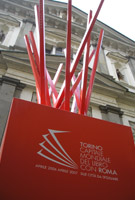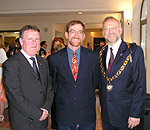- Categories:
ABA President-Elect Russ Lawrence on Last Week's International Booksellers Federation Conference
Incoming ABA President Russ Lawrence of Chapter One Book Store in Hamilton, Montana, provides BTW readers with a report on his trip to Italy last week to attend the International Booksellers Federation's Annual Conference, held in conjunction with the Turin International Book Fair.
 A sculpture proclaiming "Turin, Book Capital of the World." |
The sense that the Turin International Book Fair is a big deal begins to grow when you see the kiosk advertising it in the Milan train station, 140 kilometers distant. Turin ("Torino" to those of you familiar with it as the host city of this year's Winter Olympics) is justifiably proud of its status as "Book Capital of the World," a title it shares with Rome this year. Bookstores seemingly occupy every block of the city, and it has been the home of writers from Erasmus and Nietzsche to more contemporary writers including Umberto Eco and Primo Levi. The city's pedestrian malls are populated with odd metal sculptures advertising the city's literary status, although they look disturbingly like a large order of metallic French fries.
The International Booksellers Federation (IBF) brings together representatives from national booksellers organizations (such as ABA) throughout the world. From its office in Brussels, they compile information on bookselling worldwide, provide networking opportunities, and promote bookshops as the place to buy books, wherever you go. IBF also provides support for members when they need to lobby their governments on issues affecting the book trade.
|
|
In celebration of IBF's 50th year, it is producing a calendar featuring 50 unique bookshops from around the world. I and the other members of the calendar selection committee began our time in Turin by winnowing the 50 finalists from the 734 photos submitted. The committee concluded its intense negotiations without any international incidents taking place, though no delegate escaped the process completely unbloodied. People feel strongly about how bookselling should be represented!
It was a pleasure seeing photos of so many beautiful bookshops from throughout the world, from the quaint and rustic to the ultra-modern, all dedicated to bringing books and readers together. The calendar -- which promises to be striking -- will be unveiled at the Frankfurt Book Fair in October and will include a number of U.S. bookshops.
The business of the IBF took place at the Turin International Book Fair, a very substantial affair that, for what it lacks in size compared to BookExpo America (BEA), it more than makes up in additional chaos. The fair is open to the public, books are sold from the show floor, and it's jammed with excited kids and casual adult browsers -- making it a very different scene from BEA.
 John McNamee of Ireland, president of the European Booksellers Federation; ABA President-elect Lawrence; and Eric Hardin, president of the International Booksellers Federation. |
Much of the IBF program revolved around issues related to "digitization." The digital world is coming to bookstores, whether we're ready or not, and in many ways the first wave of it has already swept over us. E-books in one form or another are already an accepted format; digital downloads of audiobooks in MP3 and other formats are a reality, and publishers and booksellers alike are scrambling to catch up, all over the world.
European booksellers are frequently more dependent on sales of academic titles than we are, and they are already feeling the effects of the coming changes. While in some areas publishers are attempting to go direct to the customer with academic texts, in others, specifically Germany, publishers and booksellers are working together to develop new business models that will benefit both in the digital age.
The conferees also heard from Frederic Meriot, director of Development of Hachette Livre, the new owners of Time/Warner, and Italian publisher Federico Motta. Meriot spoke specifically of Hachette's plans for their new North American holdings, and both gave a publisher's-eye-view of the shifting nature of book publishing and distribution. Problems include an environment where readers are buying fewer books, where the market is increasingly bestseller-driven, and the means of delivering the content is "fluid."
Nearly all the speakers emphasized the need for increased bookstore staff training and a willingness to accept new bookselling models. As ABA begins the process for developing its next five-year Strategic Plan, this was an invaluable bit of "environmental scanning."
The last day of the IBF meeting was given over to "Country Reports," where delegates briefly discussed significant aspects of bookselling in their home countries. These reports drove home the notion that you can't make any assumptions about international bookselling: We saw video of a Russian store that is amazingly well-merchandised and lavishly outfitted and viewed a lively Belgian music video promoting reading among teens.
In a session the preceding day, Francis Bennett of Nielsen BookScan had posed the question, "Will there be bookshops in 2010?" It's sobering simply to hear the question put, but the enthusiasm of booksellers worldwide, and the variety of ways we have of connecting readers with books, left most delegates hopeful. That, and the sight of hundreds of Italian school kids happy to be at a book fair!


